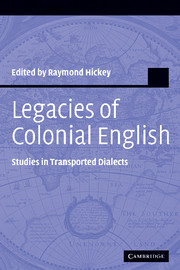Book contents
- Frontmatter
- Contents
- List of figures, maps and tables
- Contributors
- Foreword
- Introduction
- Part I Out of Britain
- Part II The New World
- Part III The southern hemisphere
- Part IV English in Asia
- Appendix 1 Checklist of nonstandard features
- Appendix 2 Timeline for varieties of English
- Appendix 3 Maps of anglophone locations
- Glossary of terms
- General references
- Index of names
- Index of languages and varieties
- General index
Introduction
Published online by Cambridge University Press: 22 September 2009
- Frontmatter
- Contents
- List of figures, maps and tables
- Contributors
- Foreword
- Introduction
- Part I Out of Britain
- Part II The New World
- Part III The southern hemisphere
- Part IV English in Asia
- Appendix 1 Checklist of nonstandard features
- Appendix 2 Timeline for varieties of English
- Appendix 3 Maps of anglophone locations
- Glossary of terms
- General references
- Index of names
- Index of languages and varieties
- General index
Summary
The emergence of overseas varieties of English
It is probably true to say that mainly regional forms of English were taken to the colonies which England founded in the core 200-year period between the early seventeenth and the early nineteenth centuries. Those who served in the overseas settlements were very largely from the lower ranges of society, irrespective of whether one is talking of deportees in early Australia, indentured servants in the early anglophone Caribbean, emigrants and adventurers of various sorts in many other colonies, the sailors who worked on the ocean-going ships, or the bailiffs and other members of the colonial service industry. The only people from the educated middle classes and higher would have been senior officials in the administration, clerical and educational staff or army officers stationed overseas. Given this situation, any treatment of colonial English is likely to be concerned with varieties which are not similar to, or even near, the current or recent historical standard of British English, even granting that the notion of ‘standard’ had a less clear profile in previous centuries than it does today.
The present book sees its justification in a number of aims which have been set by the editor and the contributors. The first is the attempt to bring into focus just what input varieties were probably operative in individual colonies.
- Type
- Chapter
- Information
- Legacies of Colonial EnglishStudies in Transported Dialects, pp. 1 - 30Publisher: Cambridge University PressPrint publication year: 2005
- 2
- Cited by



